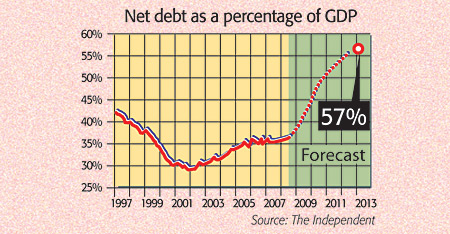
We were promised “extraordinary action” in the Pre-Budget Report (PBR). But as the FT put it, the “most extraordinary aspect was the scale of the borrowing”. Chancellor Alistair Darling announced a stimulus package worth £20bn, or 1% of GDP, the centerpiece of which is a 2.5% reduction in VAT, while there was also a package of measures to support small businesses. After 2011, the clawback will include a hike in national insurance across the board and a rise in the top rate of income tax from 40% to 45%. The latter will raise just £670m, “confirming its status as a redistributive smokescreen”, said the FT.
The boost won’t work…
The stimulus will get us nowhere. As Chris Blackhurst said in the Evening Standard, “would you cross the street” for a sign promising 2.5% off? Retailers are also already introducing much larger price cuts, which are doing little to revive spending by households severely rattled by dwindling house prices. Meanwhile, said Ian Campbell and Edward Hadas on Breakingviews, the support for small businesses is unlikely to be enough to offset the impact of tighter credit.
…and the cost is eye-watering
A bigger stimulus might have helped, but was precluded by the grievous state of the public finances. The deterioration revealed by the PBR is in any case “absolutely disastrous”, said Jeremy Warner in The Independent. Even on the Government’s overly optimistic assumptions – can growth really bounce back from the second half of 2009 in the absence of “an unexpected turnaround” in confidence and credit conditions – the deficit swells to a post-war record of 8% next fiscal year.
That means borrowing of £118bn, a far cry from the £38bn forecast for 2009/2010 in the budget in March. By 2013 we’ll have racked up £512bn of new borrowing; add this to the £526bn of net debt outstanding and debt as a proportion of GDP will peak at 57% of GDP, miles above the 40% hitherto deemed prudent by the Government.
Given all this, the risk of foreign investors losing confidence in Britain’s credit-worthiness, and hence a run on the pound, is “not small”, said Martin Wolf in the FT. The upshot? As The Times’s Matthew Parris put it, the PBR is a case of “pissing expensively into the wind”.